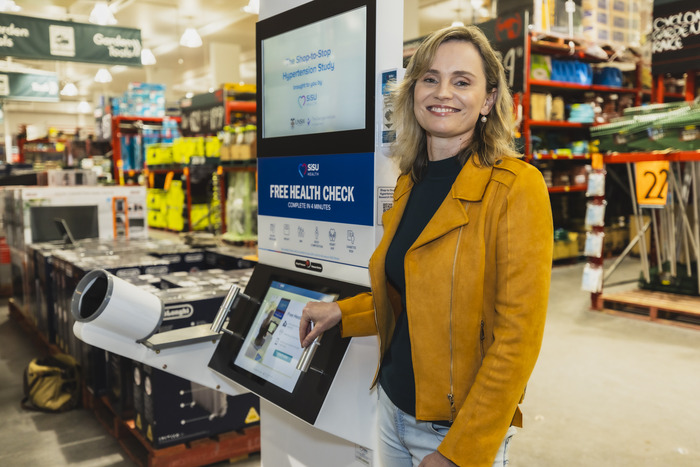Tooling up to save lives: Blood pressure trial launches in Bunnings NSW

An innovative approach to detecting hypertension (high blood pressure) from The George Institute for Global Health and UNSW Sydney in partnership with SiSU Health launches today, giving NSW residents a new way to conveniently check vital health measures at their local hardware store.
The ‘Shop2Stop Hypertension’ research study aims to identify more people with high blood pressure - still the top risk factor for death in Australia - and raise community awareness by placing SiSU Health stations in 30 Bunnings stores across NSW.1 Adults who uncover high blood pressure are referred for medical care or lifestyle guidance and can track their progress with a free app.
The trial’s lead investigator Alta Schutte, Professor of Cardiovascular Medicine at The George Institute for Global Health and UNSW Sydney, said: “Efforts to reduce the rate of high blood pressure in the community have stopped being effective over the past 10 years, and the profile of those affected is changing.
“For example, raised blood pressure is increasingly linked to stroke deaths in men aged 25 – 49 years but they wouldn’t think of themselves as being at risk,” she said. “We needed to think creatively about reaching this and other groups at high risk, in the places they already go, and Bunnings stores are a great way to do that.”
Unlike many other health issues, high blood pressure has no symptoms, and is sometimes called a ‘silent killer’ for this reason. One in three Australian adults (34%) have raised blood pressure but only 32 per cent have it under control and within a healthy range.2,3 The only way to see if someone’s blood pressure is in the unhealthy range is for them to have it checked regularly.
Prof. Schutte is Co-Chair of the National Hypertension Taskforce, which recently launched Australia’s first roadmap for increasing the nation’s rate of blood pressure control to 70 per cent by 2030, through increased awareness and detection among other measures.4
"Shockingly, only 50 per cent of Australians with high blood pressure are aware they have it, which is why I and other experts recently published the first Hypertension Roadmap,” Prof. Schutte continued. “We lag behind other similar countries, but we shouldn’t. We have the tools to identify and treat blood pressure and should be using them.”
High blood pressure contributes to numerous cardiovascular conditions including coronary heart disease and stroke, as well as dementia and kidney disease. It can be effectively treated with medication, as well as diet and lifestyle changes but Prof. Schutte says, “We can’t address high blood pressure to prevent many strokes, heart attacks and other life-threatening conditions if we don’t know who needs treatment.”
Doing a screening at a SiSU health station takes about five minutes. Customers are asked a series of questions about their age, lifestyle and family history, and given the opportunity to accurately weigh themselves, check their blood pressure and measure their heart rate. They can also sync up with the SiSU Health App to capture their results and track their progress.
“The check is free, and the self-operated machines are in discreet locations, so it’s only the individual who sees and hears their results in the store,” added Prof. Schutte.
“Importantly, the SiSU kiosk gives people recommendations on how to reduce their blood pressure and, if needed, directs them to see their GP straight away,” she said. “The good news is that if someone finds out they have high blood pressure, it can be effectively treated with medication and lifestyle changes.”
‘Shop2Stop Hypertension’ is funded by a NSW Health Cardiovascular Collaborative Grant and an NHMRC Investigator Grant, both awarded to Prof. Schutte, a leading international expert in hypertension research.
Participating Bunnings stores:
Albury, Alexandria, Armidale, Bathurst, Blacktown, Campbelltown, Chatswood, Coffs Harbour, Crossroads, Dubbo, Forbes, Forster, Glendale, Goulburn, Grafton, Griffith, Kembla Grange, Kempsey, Lismore, Narrabri, Nowra, Padstow, Penrith, Port Macquarie, Shellharbour, Smithfield, Tamworth, Valley Heights, Villawood and Wagga Wagga.

- References:
Xiaoyue Xu, Sheikh Mohammed Shariful Islam, Markus Schlaich, Garry Jennings, Aletta E Schutte. The contribution of raised blood pressure to all-cause and cardiovascular deaths and disability-adjusted life-years (DALYs) in Australia: Analysis of Global Burden of Disease Study from 1990 to 2019. PLOS ONE. February 21, 2024, doi: 10.1371/journal.pone.0297229 - Australian Institute of Health and Welfare. High blood pressure. July2019. www.aihw.gov.au/reports/risk-factors/high-blood-pressure/contents/summary. Accessed May 2024
- Zhou B, Carrillo-Larco RM, Danaei G, et al. Worldwide trends in hypertension prevalence and progress in treatment and control from 1990 to 2019: a pooled analysis of 1201 population-representative studies with 104 million participants. Lancet 2021; 398(10304): 957-80
- ‘National Hypertension Taskforce of Australia: a roadmap to achieve 70% blood pressure control in Australia by 2030.’ MJA 11 July 2024. doi.org/10.5694/mja2.52373
Stay connected and updated
Subscribe to our mailing list for the latest news, events, and updates in health research.

